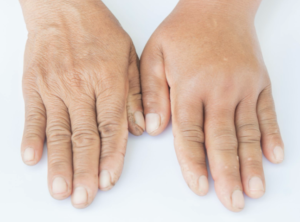SWOLLEN FINGERS
If you suffer from swelling in the hands, please Schedule an appointment with one of our orthopedic specialists as soon as possible.
Why Do Fingers Swell Up?
Swollen fingers, hands, and arms commonly occurs with many different injuries and medical conditions. Hand and Wrist Specialists know the importance of identifying the root cause so that they can start the appropriate treatment whilst avoiding complications.
Causes of Swelling in the Hand and Fingers.
Swelling can sometimes occur due to an injury in the hand or arm. Traumatic injuries, such as a broken bone, often result in large amounts of fluid rushing to the injured area. This naturally occurs as part of the body’s healing response. The body uses inflammation as a way to deliver extra blood and fluid to the site of the injury, to increase the amount of cells and healing factors available for repair. Too much inflammation, however, can add painful amounts of pressure to the area.
Medical conditions can also result in swollen fingers and swollen hands. Arthritis commonly results in swelling of the hands, commonly at its worst in the morning just after waking. Infections may also sometimes result in swelling, and patients should take care of them right away. Localized swelling from cysts or tumors should fall under the jurisdiction of Hand and Wrist Specialists.
Fluids in the body maintain a certain balance through many different processes. If something throws off these processes, fluid can accumulate in areas like the hands, which leads to swelling. Patients can have a higher risk of fluid retention due to:
- Improper Diet with large amounts of salt/carbs.
- Other medical issues such as thyroid, liver, or kidney disease can contribute to fluid retention.
- Pregnant women can often retain fluids, As well as Perimenopausal or Menopausal Women.
- In some cases, certain medications can cause swelling in the hands. These can include steroids, aspirin, ibuprofen, hormonal therapies such as estrogen or testosterone, diabetes medications and blood pressure medications.
Sometimes swelling or cracked hands can come from a source outside the body like contact dermatitis. Physicians use Contact Dermatitis as a general term for an irritated rash on the skin caused by direct contact with a substance, i.e. soap, bleach, or other chemicals. Patients can avoid contact dermatitis by avoiding the chemical and using steroid ointments or cream to clear the dermatitis on the skin.
Symptoms of hand contact dermatitis can include:
- An itchy rash on your hand
- Swollen hands
- Dry, cracked hands
- Blisters
When Should You Contact a Physician?
You should contact a physician if the swollen hands occur on a child with sickle cell disease, or alongside a fever. Those who should also contact a physician when they experience swollen hands include:
- Pregnant women
- Patients starting on a new medication.
- Those already suffering from arthritis, sickle cell, or organ failure.
- Those showing a growth on the hand.
- Those with open sores on the hand or fingers.
When Should You Go to the Emergency Room?
Patients who experience the following should consider seeking immediate medical attention:
- Tingling, numb, weak, or cold fingers following a serious hand injury.
- Difficulty breathing
- Facial swelling.
- Difficulty moving the fingers.
- Hand swelling specifically after receiving a bite from an animal or human.
- Pain and swelling caused by falling down onto the hand.
- Swelling in response to an allergic reaction.
How do Hand & Wrist Specialists Treat Swollen Fingers?
Conservative Care
Specific treatment will depend on the source of the swelling, but resting, icing the hand, compressing and elevating the hand will usually resolve cases of cracked or swollen hands. Patients can also take pain medications to manage any discomfort.
- Icing an injury immediately following the incident can drastically reduce swelling.
- Ibuprofen and other non-steroidal anti-inflammatory painkillers can help relieve pain from swollen joints.
- Compression assists the blood vessels in removing excess fluid from an area.
- Elevation also helps carry fluid away from injured areas of the hand by using gravity to pull the blood away from the vessels.


